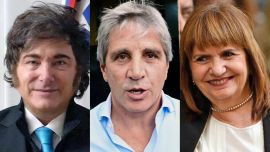The Executive Board of the International Monetary Fund (IMF) today approved a stand-by agreement with Argentina worth US$50 billion, immediately authorising the release of US$15 billion.
It is the largest loan in the institution's history, Bloomberg reported.
In an official statement, the IMF reported that the formal approval of the programme by the board of directors and said it would allow Argentina to "make an immediate purchase of US$15 billion."
"The Board’s decision allows the authorities to make an immediate purchase of US$15 billion. One half of this amount (US$7.5 billion) will be used for budget support. The remaining amount of IMF financial support (US$35 billion) will be made available over the duration of the arrangement, subject to quarterly reviews by the Executive Board. The authorities have indicated that they intend to draw on the first tranche of the arrangement but subsequently treat the remainder of the arrangement as precautionary," an official statement read.
The second half of the US$15 billion figure will be reserved for operations by the Central Bank as it seeks to stabilise the foreign exchange market.
Preisdent Mauricio Macri's government turned to the IMF in May, announcing he would seek a financing deal following the sharp devaluation of the peso against the dollar, amid a tough global outlook.
"My conviction is that we are travelling down the only possible way out of the stalemate, always seeking to avoid a major economic crisis that will make us back down and harm everyone," Macri said as he announced the decision to seeking IMF funding.
The decision unsettled many Argentines, some of whom blame the IMF for introducing policies that led to the country’s economic implosion in 2001 and its record US$100-billion bond default in 2002. The crisis left one of every five Argentines out of work.
The IMF said that the economic plan adopted by the Argentine government seeks to "strengthen the country's economy by restoring market confidence."
The government has outlined an economic plan that includes a "consistent macroeconomic programme that lessens financing needs, puts Argentina’s public debt on a firm downward trajectory, and strengthens the plan to reduce inflation by setting more realistic inflation targets and reinforcing the independence of the central bank," the IMF added.
"Importantly, the plan includes steps to protect society’s most vulnerable by maintaining social spending and, if social conditions were to deteriorate, by providing room for greater spending on Argentina’s social safety net," the institution added.
Under the terms of the government, the government has set new inflation targets for the coming years and will seek to reduce the fiscal deficit to 1.3 percent of GDP next year, down from 2.2 percent previously. The government is also aiming to lower the fiscal deficit from its current 2.7 percent of GDP to 1.3 percent next year and 0 percent in 2020, a year ahead of schedule. This will likely mean further belt-tightening measures.
IMF Managing Director Christine Lagarde said the government had "demonstrated its strong ownership of the programme, which is custom-tailored for the situation faced by the people of Argentina."
She added: "There are evident risks to the programme but steadfast implementation of the policy plans will allow the country to fully capitalise on its economic potential, and to ensure that all Argentines are included in the country’s future prosperity.”
Reshuffle
The currency crisis pushed the President Macri, this month to reshuffle his economic team. Two weeks ago Central Bank head Federico Sturzenegger was ousted, replaced by the former finance minister, Luis Caputo, a former Deutsche Bank executive. Caputo's main task is to prevent a run on the peso, which has lost nearly 35 percent of its value since January. Last Saturday Macri also dismissed two other Cabinet ministers, Juan José Aranguren, the former president of Anglo-Dutchoil company Shell in Argentina, and production minister Francisco Cabrera.
Caputo, in his first public comments since replacing Sturzenegger, said the IMF deal would give more clarity.
“It will offer a panorama of what supply will be,” said Caputo, who had served as finance minister before taking over the role of central bank governor. “We are in a transition toward greater exchange rate stability.”
On Tuesday, the Central Bank rose interest rates from 40 to 47 percent.
Based on the economic programme accepted by the IMF, the exchange rate must be free and the government can not use the dollars to calm runs or finance external deficit. The peso is down more than 32 percent so far this year, Bloomberg highlighted, placing it among worst performing currencies in emerging markets.
"The agreement with the IMF calls for stopping the creation of money, which never went away, 30 percent year-on-year in the outgoing administration of the BCRA [Central Bank], which means that it can no longer be issued to finance the government, nor to accumulate reserves, nor issue payment of the interests of the Lebacs," economist Ramiro Castiñera, from the Econometric consultancy firm, told AFP.
The move toward the IMF has been rejected by sectors of the opposition, which demand that the agreement be debated in Congress, and by the main unions.
Support for the changes the government is seeking to make will be essential if the terms are to be met. One of the most critical upcoming points will be the approval of a 2019 budget in which cuts to funding for the provinces, to public works and to the size of the state must be laid out, all in an election year.
"A long and difficult road lies ahead, one that will test the strength of the political leadership and the capacity of society for sacrifice. The success of the agreement with the IMF will depend on the interaction between the ruling party and the opposition, the social capacity to contain or channel the protest and the president's long-term vision," said political analyst Rosendo Fraga.
- AFP/TIMES


























Comments